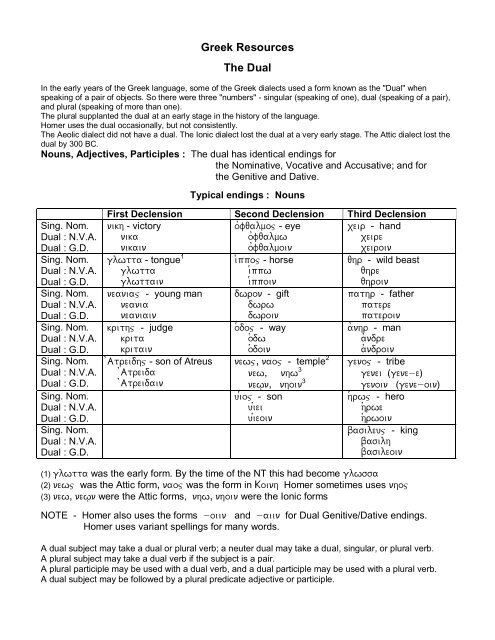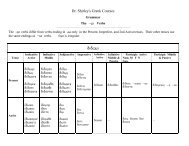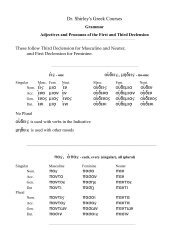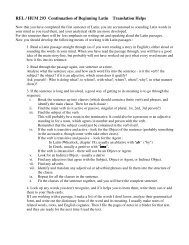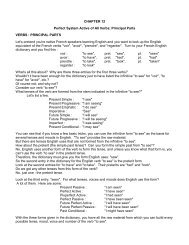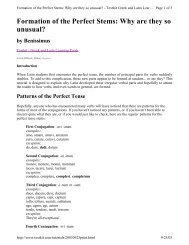The Dual
The Dual
The Dual
Create successful ePaper yourself
Turn your PDF publications into a flip-book with our unique Google optimized e-Paper software.
Greek Resources<br />
<strong>The</strong> <strong>Dual</strong><br />
In the early years of the Greek language, some of the Greek dialects used a form known as the "<strong>Dual</strong>" when<br />
speaking of a pair of objects. So there were three "numbers" - singular (speaking of one), dual (speaking of a pair),<br />
and plural (speaking of more than one).<br />
<strong>The</strong> plural supplanted the dual at an early stage in the history of the language.<br />
Homer uses the dual occasionally, but not consistently.<br />
<strong>The</strong> Aeolic dialect did not have a dual. <strong>The</strong> Ionic dialect lost the dual at a very early stage. <strong>The</strong> Attic dialect lost the<br />
dual by 300 BC.<br />
Nouns, Adjectives, Participles : <strong>The</strong> dual has identical endings for<br />
the Nominative, Vocative and Accusative; and for<br />
the Genitive and Dative.<br />
Typical endings : Nouns<br />
Sing. Nom.<br />
<strong>Dual</strong> : N.V.A.<br />
<strong>Dual</strong> : G.D.<br />
Sing. Nom.<br />
<strong>Dual</strong> : N.V.A.<br />
<strong>Dual</strong> : G.D.<br />
Sing. Nom.<br />
<strong>Dual</strong> : N.V.A.<br />
<strong>Dual</strong> : G.D.<br />
Sing. Nom.<br />
<strong>Dual</strong> : N.V.A.<br />
<strong>Dual</strong> : G.D.<br />
Sing. Nom.<br />
<strong>Dual</strong> : N.V.A.<br />
<strong>Dual</strong> : G.D.<br />
Sing. Nom.<br />
<strong>Dual</strong> : N.V.A.<br />
<strong>Dual</strong> : G.D.<br />
Sing. Nom.<br />
<strong>Dual</strong> : N.V.A.<br />
<strong>Dual</strong> : G.D.<br />
First Declension Second Declension Third Declension<br />
nikh - victory<br />
o0fqalmoj - eye xeir - hand<br />
nika<br />
o0fqalmw<br />
xeire<br />
nikain<br />
o0fqalmoin<br />
xeiroin<br />
glwtta - tongue 1<br />
glwtta<br />
glwttain<br />
neaniaj - young man<br />
neania<br />
neaniain<br />
krithj - judge<br />
krita<br />
kritain<br />
0Atreidhj - son of Atreus<br />
0Atreida<br />
0Atreidain<br />
i9ppoj - horse<br />
i9ppw<br />
i9ppoin<br />
dwron - gift<br />
dwrw<br />
dwroin<br />
o(doj - way<br />
o(dw<br />
o(doin<br />
newj, naoj - temple 2<br />
new, nhw 3<br />
new|n, nhoin 3<br />
ui(oj - son<br />
ui(ei<br />
ui(eoin<br />
qhr - wild beast<br />
qhre<br />
qhroin<br />
pathr - father<br />
patere<br />
pateroin<br />
a)nhr - man<br />
a)ndre<br />
a)ndroin<br />
genoj - tribe<br />
genei (gene-e)<br />
genoin (gene-oin)<br />
h(rwj - hero<br />
h(rwe<br />
h(rwoin<br />
basileuj - king<br />
basilh<br />
basileoin<br />
(1) glwtta was the early form. By the time of the NT this had become glwssa<br />
(2) newj was the Attic form, naoj was the form in Koinh Homer sometimes uses nhoj<br />
(3) new, new|n were the Attic forms, nhw, nhoin were the Ionic forms<br />
NOTE - Homer also uses the forms -oiin and -aiin for <strong>Dual</strong> Genitive/Dative endings.<br />
Homer uses variant spellings for many words.<br />
A dual subject may take a dual or plural verb; a neuter dual may take a dual, singular, or plural verb.<br />
A plural subject may take a dual verb if the subject is a pair.<br />
A plural participle may be used with a dual verb, and a dual participle may be used with a plural verb.<br />
A dual subject may be followed by a plural predicate adjective or participle.
Sing. Nom.<br />
<strong>Dual</strong> : N.V.A.<br />
<strong>Dual</strong> : G.D.<br />
Sing. Nom.<br />
<strong>Dual</strong> : N.V.A.<br />
<strong>Dual</strong> : G.D.<br />
Sing. Nom.<br />
<strong>Dual</strong> : N.V.A.<br />
<strong>Dual</strong> : G.D.<br />
Sing. Nom.<br />
<strong>Dual</strong> : N.V.A.<br />
<strong>Dual</strong> : G.D.<br />
Sing. Nom.<br />
<strong>Dual</strong> : N.V.A.<br />
<strong>Dual</strong> : G.D.<br />
Sing. Nom.<br />
<strong>Dual</strong> : N.V.A.<br />
<strong>Dual</strong> : G.D.<br />
Sing. Nom.<br />
<strong>Dual</strong> : N.V.A.<br />
<strong>Dual</strong> : G.D.<br />
Typical endings : Adjectives<br />
a0gaqoj -h -on - good megaj megalh mega - great<br />
a0gaqw -a -w<br />
megalw megala megalw<br />
a0gaqoin -ain -oin<br />
megaloin megalain megaloin<br />
a0cioj -a -on - worthy meizwn meizon - greater<br />
a0ciw -a -w<br />
meizone meizone<br />
a0cioin -ain -oin<br />
meizonoin meizonoin<br />
a0lhqhj -ej - true<br />
taxuj taxeia taxu - swift<br />
a0lhqei -ei<br />
taxe-e taxeia taxe-e<br />
a0lhqoin -oin<br />
taxe-oin taxeiain taxe-oin<br />
Typical endings : Participles<br />
w)n ou)sa o)n - being<br />
o)nte ou)sa o)nte<br />
o)ntoin ou)sain o)ntoin<br />
luwn -ousa -on - loosing<br />
luonte -ousa -onte<br />
luontoin -ousain -ontoin<br />
lusaj lusasa lusan - having loosed<br />
lusante lusasa lusante<br />
lusantoin lusasain lusantoin<br />
tiqeij tiqeisa tiqen - placing<br />
tiqente tiqeisa tiqente<br />
tiqentoin tiqeisain tiqentoin<br />
didouj didousa didon - giving<br />
didonte didousa didonte<br />
didontoin didousain didontoin<br />
lelukwj lelukuia lelukon - having loosed<br />
lelukote lelukuia lelukote<br />
lelukotoin lelukuiain leluktoin<br />
ei)dwj ei)duia ei)doj - knowing<br />
ei)dote ei)duia ei)dote<br />
ei)dotoin ei)duiain ei)dotoin<br />
Sing. Nom.<br />
<strong>Dual</strong> : N.V.A.<br />
<strong>Dual</strong> : G.D.<br />
Sing. Nom.<br />
<strong>Dual</strong> : N.V.A.<br />
<strong>Dual</strong> : G.D.<br />
Sing. Nom.<br />
<strong>Dual</strong> : N.V.A.<br />
<strong>Dual</strong> : G.D.<br />
e0gw - I 1<br />
nw - we two 1<br />
nw|n<br />
su - you 2<br />
sfw - you two<br />
sfw|n<br />
Pronouns, <strong>The</strong> Definite Article<br />
au)toj au)th au)to - he, she, it<br />
au)tw& au)ta& au)tw&<br />
au)toin au)tain au)toin<br />
ou(toj au(th touto - this<br />
tou&tw tou&tw tou&tw<br />
toutoin toutoin toutoin<br />
e0keinoj e0keinh e0keino - that<br />
e0keinw e0keinw e0keinw<br />
e0keinoin e0keinoin e0keinoin<br />
(1) Homer has e0gw, e0gwn, NVA nwi+, nw ; GD nwi+n<br />
(2) Homer has su, tunh, NVA sfwi+, sfw, sfwe; GD sfwi+n, sfw|n<br />
o( h( to - the<br />
tw& tw& tw&<br />
toin toin toin<br />
o3j h# o# - who, which<br />
w3 w3 w3<br />
oi(n oi(n oi(n<br />
tij ti - someone<br />
tine tine<br />
tinoin tinoin<br />
Verbs<br />
<strong>The</strong> First Person <strong>Dual</strong> is the same as the First Person Plural except for a few instances in poetry.<br />
<strong>The</strong> forms of the Second and Third Persons <strong>Dual</strong> are identical or very similar to each other.<br />
Tense, Mood, Voice<br />
Primary tenses Indicative Active, and Subjunctive Active<br />
Secondary tenses Indicative Active, and Optative Active<br />
Primary tenses Indicative Middle/Passive, and Subjunctive Middle/Passive<br />
Secondary tenses Indicative Middle/Passive, and Optative Middle/Passive<br />
Imperative Active<br />
Imperative Middle/Passive<br />
Person<br />
2<br />
3<br />
2<br />
3<br />
2<br />
3<br />
2<br />
3<br />
2<br />
3<br />
2<br />
3<br />
-ton<br />
-ton<br />
-ton<br />
-thn<br />
-sqon<br />
-sqon<br />
-ston<br />
-sqhn<br />
-ton<br />
-twn<br />
-sqon<br />
-sqwn
Tense, Mood, Voice Pers. luw I loose tiqhmi I place didwmi I give ei)mi I am<br />
2 lueton<br />
tiqeton<br />
didoton<br />
0iton<br />
Present Indicative Active<br />
3 lueton<br />
tiqeton<br />
didoton<br />
0iton<br />
2 luseton<br />
Future Indicative Active<br />
3 luseton<br />
2 e0lueton<br />
e0tiqeton<br />
e0didoton h|)ton<br />
Imperfect Indicative Active<br />
3 e0luethn<br />
e0tiqethn<br />
e0didothn h)|thn<br />
2 e0lusaton e0qeton<br />
e0dosqon<br />
Aorist Indicative Active<br />
3 e0lusathn e0qethn<br />
e0dosqhn<br />
2 lelukaton<br />
Perfect Indicative Active<br />
3 lelukaton<br />
2 e0lelukaton<br />
Pluperfect Indicative Active<br />
3 e0lelukathn<br />
2 luhton<br />
tiqhton<br />
didwton 0ihton<br />
Present Subjunctive Active<br />
3 luhton<br />
tiqhton<br />
didwton 0ihton<br />
2 lushton<br />
qhton<br />
dwson<br />
Aorist Subjunctive Active<br />
3 lushton<br />
qhton<br />
dwson<br />
2 lelukhton<br />
Perfect Subjunctive Active<br />
3 lelukhton<br />
2 luoiton<br />
tiqeiton<br />
didoiton 0ioiton<br />
Present Optative Active<br />
3 luoithn<br />
tiqeithn<br />
didoithn 0ioithn<br />
2 lusoiton<br />
Future Optative Active<br />
3 lusoithn<br />
2 lusaiton qeiton<br />
doiton<br />
Aorist Optative Active<br />
3 lusaithn qeithn<br />
doithn<br />
2 lelukoiton<br />
Perfect Optative Active<br />
3 lelukoithn<br />
2 lueton<br />
tiqeton<br />
didoton<br />
0iton<br />
Present Imperative Active<br />
3 luetwn<br />
tiqetwn<br />
didotwn 0itwn<br />
2 lusaton<br />
qeton<br />
doton<br />
Aorist Imperative Active<br />
3 lusatwn qetwn<br />
dotwn<br />
2 luesqon<br />
tiqesqon<br />
didosqon<br />
Present Indicative Middle<br />
3 luesqon<br />
tiqesqon<br />
didosqon<br />
2 lusesqon<br />
Future Indicative Middle<br />
3 lusesqon<br />
2 e0luesqon<br />
Imperfect Indicative Middle<br />
3 e0luesqon<br />
2 e0lusasqon e0qesqon<br />
e0dosqon<br />
Aorist Indicative Middle<br />
3 e0lusasqhn e0qesqhn<br />
e0dosqhn<br />
2 lelusqon<br />
Perfect Indicative Middle<br />
3 lelusqon<br />
2 e0lelusqon<br />
Pluperfect Indicative Middle<br />
3 e0lelusqon<br />
2 luhsqon<br />
tiqhsqon<br />
didwsqon<br />
Present Subjunctive Middle<br />
3 luhsqon<br />
tiqhsqon<br />
didwsqon<br />
2 lusqhsqon qhsqon<br />
dwsqon<br />
Aorist Subjunctive Middle<br />
3 lusqhsqon qhsqon<br />
dwsqon<br />
2 luoisqon<br />
tiqeisqon<br />
didoisqon<br />
Present Optative Middle<br />
3 luoisqhn<br />
tiqeisqhn<br />
didoisqhn<br />
2 lusoisqon<br />
Future Optative Middle<br />
3 lusoisqhn<br />
2 lusaisqon qeisqon<br />
doisqon<br />
Aorist Optative Middle<br />
3 lusaisqhn qeisqhn<br />
doisqhn<br />
2 luesqon<br />
tiqesqon<br />
didosqon<br />
Present Imperative Middle<br />
3 luesqwn<br />
tiqesqwn<br />
didosqwn<br />
2 lusasqon qesqon<br />
dosqon<br />
Aorist Imperative Middle<br />
3 lusasqwn qesqwn<br />
dosqwn<br />
2 luqhsesqon<br />
Future Indicative Passive<br />
3 luqhsesqon<br />
2 e0luqhton<br />
Aorist Indicative Passive<br />
3 e0luqhthn<br />
2 luqhton<br />
Aorist Subjunctive Passive<br />
3 luqhton<br />
2 luqhton<br />
Aorist Imperative Passive<br />
3 luqhtwn


